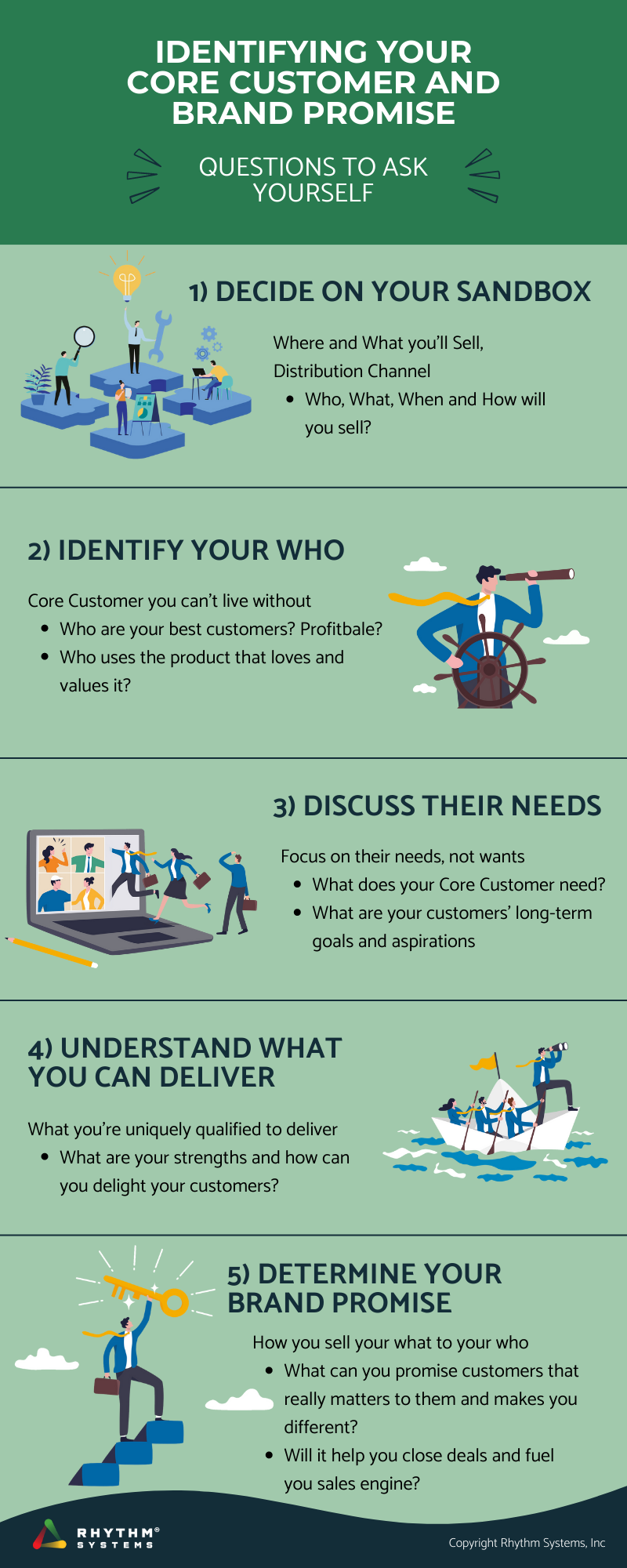No matter what business your company is in, it's a safe bet to assume that you'll need to be able to adapt to the changing conditions around you. In the same way that businesses change, customers change as well. Paying attention to your customers sounds easy enough, right? That might not always be the case…
Sure, you might have been in tune with your customers when they first became customers, but their needs change over time. It's essential to stay in tune with those changes to keep customer satisfaction and margins high.
Identify Your Core Customer and Brand Promise
For starters, let's identify your core customers:
.png?width=1843&name=Your%20Brand%20Promise%20and%20core%20customer%20(1).png)
While you're identifying your core customer, there are a few questions to ask yourself about your business that can help you determine the path you need to take toward success:
Step 1: Decide On Your Sandbox
Determine where and what you sell and through what distribution channels. Find the answers to these questions:
- Where will you dominate over the next 3-5 years?
- What will you sell?
- To whom will you sell?
- Where will you sell?
- How will you sell?
Step 2: Identify Your WHO
Your "WHO" is THE CORE CUSTOMER you can't live without. To identify your core customer, ask yourself these questions:
- Who are your best profitable customers?
- What does your team love about working with them?
- Who uses the product that loves and values it?
- What do they all have in common?
- Who are your worst customers?
Step 3: Discuss Your Core Customer's Needs
When determining your core customer's needs, it is essential to focus on their NEEDS and not their WANTS. To accomplish this, use these questions to guide your conversation:
- What does your core customer need?
- What are your customer's long-term goals and aspirations?
- What creates customer happiness? What delights them?
- What will make them successful in their jobs?
Step 4: Understand What You Deliver
This step helps to identify exactly what your organization is uniquely qualified to deliver. To determine this, answer the following questions:
- What are your strengths, and how can you delight your customers?
- What things are not easy for competitors to imitate and set you apart in the marketplace?
- What benefit do you offer your customers that they do not receive from another source?
Step 5: Determine Your Brand Promise
This involves how you sell your 'what' to your 'who.' These questions will help you as you build your brand promise:
- What can you promise customers that matter to them and makes you different?
- Will this attract the right customer?
- Will it help you close deals and fuel your sales engine?
Why is it Important to Know Your Core Customer?
- You can focus your resources.
- You can sell to them at optimal prices & quantities
- You can foster happiness within your customer
- You'll be promoting profitable sales growth into the future
Something special happens when you fine-tune your business to be perfectly aligned with your best customers. It's a commonly used adage that 80% of your business comes from 20% of your customers; your core customers will buy at the optimal price & quantity to generate a profit and promote future growth.
Ask These Questions About Your Core Customer
Now that you've identified your core customers, ask yourself a few questions:
What do you love about working with them?
When you know what makes you excited to work with certain customers, you can focus on those aspects and foster a better business relationship that benefits both parties.
What do they love about working with you?
Find out what it is about your business that keeps your best customers coming back.
Always ensure those aspects of your business are refined and that you have taken care of your customers' needs.
You can find a lot of this information by gathering data, but you can also conduct customer interviews. There's nothing wrong with asking your customers what they like about working with you! In fact, you will learn new things that will strengthen your relationships.
Rhythm Systems makes it easy for you to gather data on your best customers. That data will ultimately help your business analyze its ability to provide the right products and services.
When determining your ability to provide the right products and services, you want to:
- Deliver a unique offering
- Manufacture products that meet the customer's true needs
- Provide the highest levels of service & expertise
- Figure out the best processes, systems, and tools to use
- Collect continuous feedback and iterate – what's next?
- Wow! your customers so that they become referrals
Of course, all this takes time, but the benefits are well worth it. You'll be able to attract the right customers to your business and expand your bottom line, closing deals faster and with more efficiency. You'll also be able to cut costs by refocusing where you direct marketing and place ads. Growing alongside your customers makes your business sticky and better able to adapt to changing business conditions, creating happiness for all! And you will watch your profits increase alongside your employee happiness.
Grow with intent, Alan





